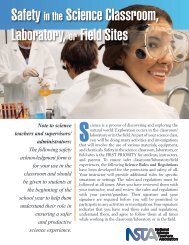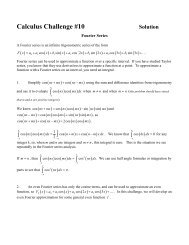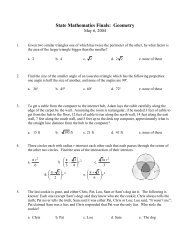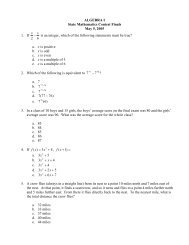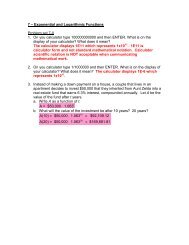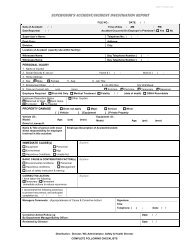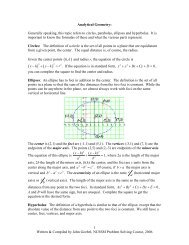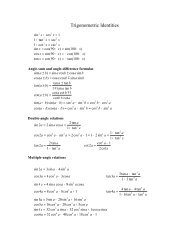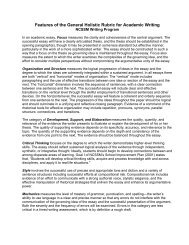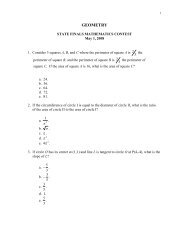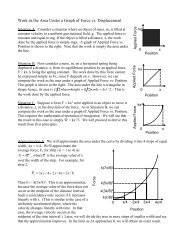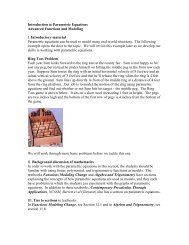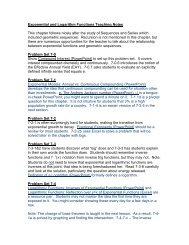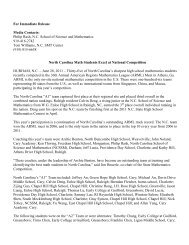NCSSM COURSE CAtAlOG - North Carolina School of Science and ...
NCSSM COURSE CAtAlOG - North Carolina School of Science and ...
NCSSM COURSE CAtAlOG - North Carolina School of Science and ...
You also want an ePaper? Increase the reach of your titles
YUMPU automatically turns print PDFs into web optimized ePapers that Google loves.
Meeting pattern: Two 100-minute evening class meetings.<br />
This course begins with the splintering <strong>of</strong> medieval Christendom <strong>and</strong> continues<br />
with the twelfth-century Renaissance, the rise <strong>of</strong> universities, <strong>and</strong> the philosophic<br />
debate over the nature <strong>and</strong> source <strong>of</strong> knowledge. We examine the<br />
development <strong>of</strong> national languages <strong>and</strong> vernacular literatures. We read lifewriting<br />
by medieval Anchoresses who, by choice, spent their lives walled into<br />
tiny cells. We read Dante’s Inferno, selections from Chaucer’s Canterbury Tales,<br />
literary theorists like Boccaccio <strong>and</strong> Hugh <strong>of</strong> St. Victor, poems <strong>and</strong> letters by<br />
Petrarch, political treatises by Machiavelli, <strong>and</strong> plays by Shakespeare <strong>and</strong><br />
Christopher Marlowe. We encounter characters like Dr. Faustus, who barters his<br />
soul for knowledge, <strong>and</strong> Hamlet <strong>and</strong> Macbeth, who find themselves imprisoned<br />
in the private spaces <strong>of</strong> their minds. The course concludes with Thirty Years’ War<br />
<strong>and</strong> the English Civil War. We close with the philosophy <strong>of</strong> Descartes, who<br />
redefines the personal self, <strong>and</strong> with the poetry <strong>of</strong> the English Civil War <strong>and</strong><br />
French Absolutism.<br />
EN440 Western European Cultural Studies III: 1650 to Present<br />
One trimester<br />
Credit: One unit core English credit, one unit core elective credit.<br />
Prerequisite: Completion <strong>of</strong> three trimesters <strong>of</strong> AS303 Writing <strong>and</strong> American<br />
Studies or AS305 American Studies or completion <strong>of</strong> two trimesters <strong>of</strong> AS303 or<br />
AS305 <strong>and</strong> permission <strong>of</strong> the Dean <strong>of</strong> Humanities. EN436 WECS I <strong>and</strong> EN438<br />
WECS II suggested, not required.<br />
Meeting pattern: Two 100-minute evening class meetings.<br />
This course explores the emergence <strong>of</strong> the modern world, the modern self, the<br />
modern state, the modern balance <strong>of</strong> power, <strong>and</strong> modern commercial<br />
enterprises <strong>and</strong> empires. Topics include the emergence <strong>of</strong> Romanticism, the<br />
alienating world <strong>of</strong> industrial culture, <strong>and</strong> new theories about nature <strong>and</strong> history.<br />
We examine Modernism in all its forms—in psychology, in narrative, in the visual<br />
arts, in social planning, <strong>and</strong> in cinema. We also examine the impact <strong>of</strong> world<br />
wars, globalism, the newest versions <strong>of</strong> cultural imperialism, <strong>and</strong> the modern<br />
world’s obsessions with self <strong>and</strong> self-revelation. Students sharpen their skills in<br />
reading, writing, <strong>and</strong> critical thinking. Readings include Rousseau, the English<br />
Romantics, Darwin, Marx, Kierkegaard, Baudelaire, Nietzsche, Heidegger,<br />
Virginia Woolf, <strong>and</strong> Joseph Conrad, as well as contemporary writers.<br />
EN442 Western Civilization: Wisdom, Revelation, Reason & Doubt I (The Ancient<br />
World to the High Middle Ages)<br />
One trimester<br />
Credit: One unit core English credit, one unit core elective credit.<br />
22



